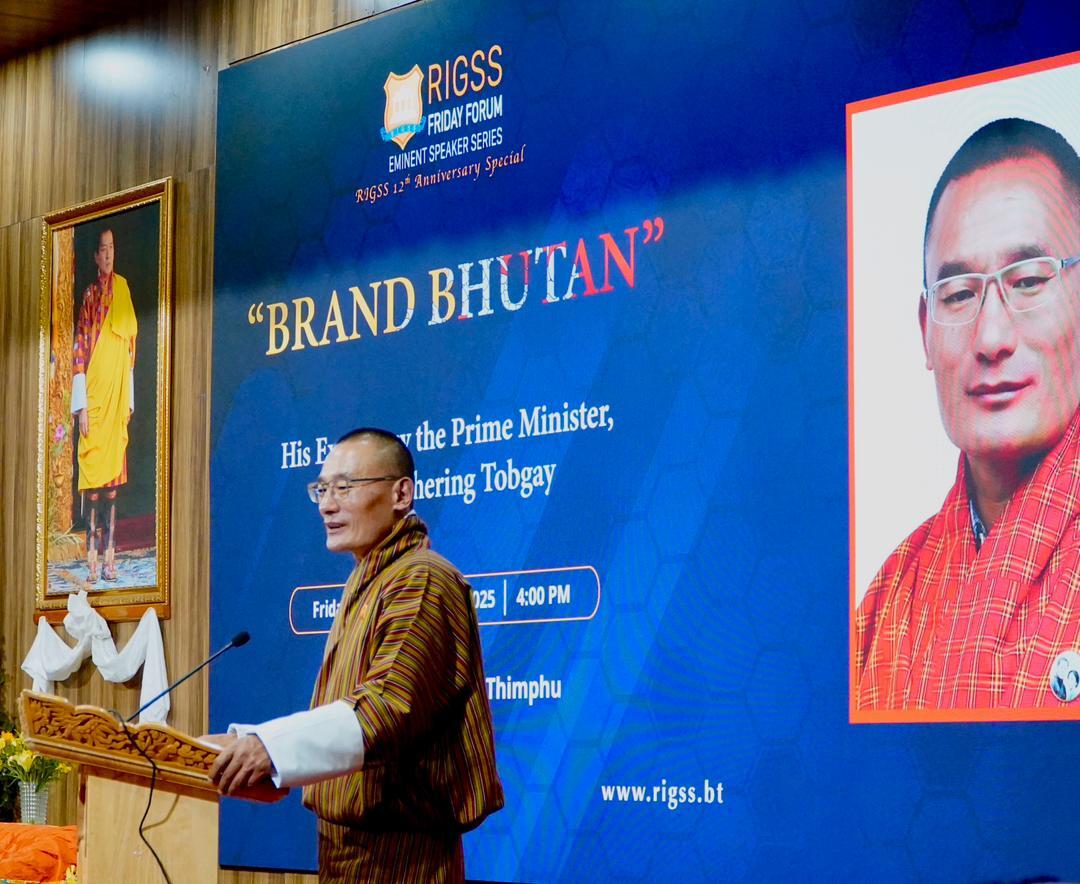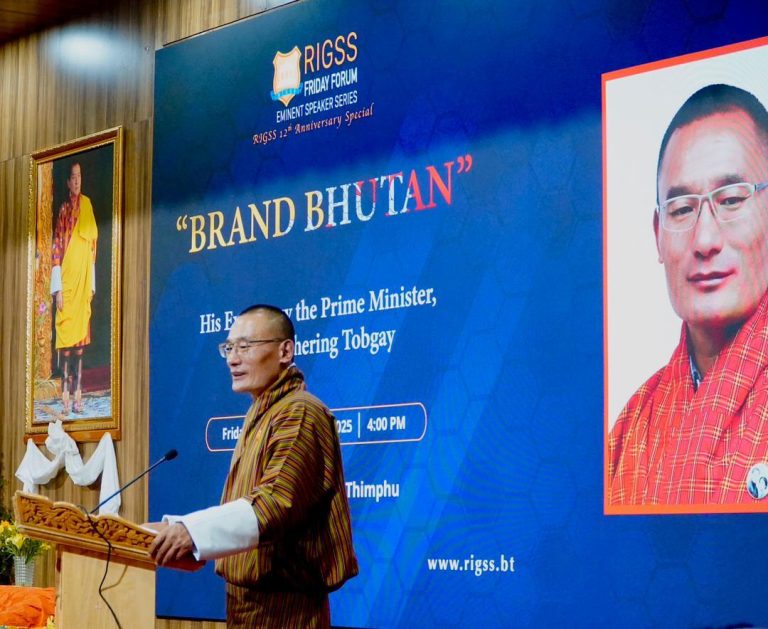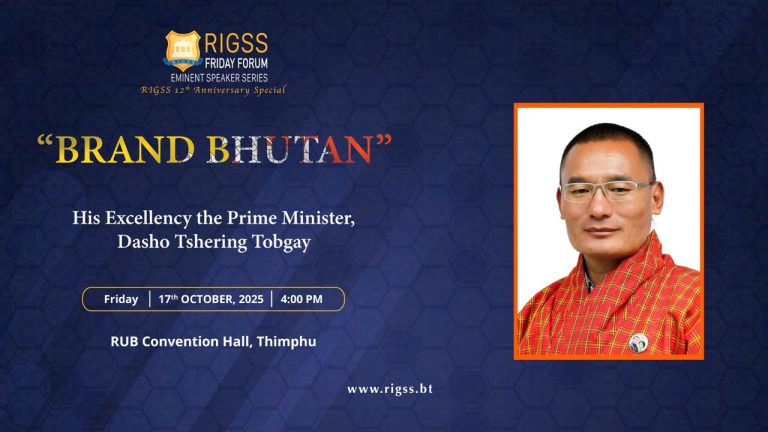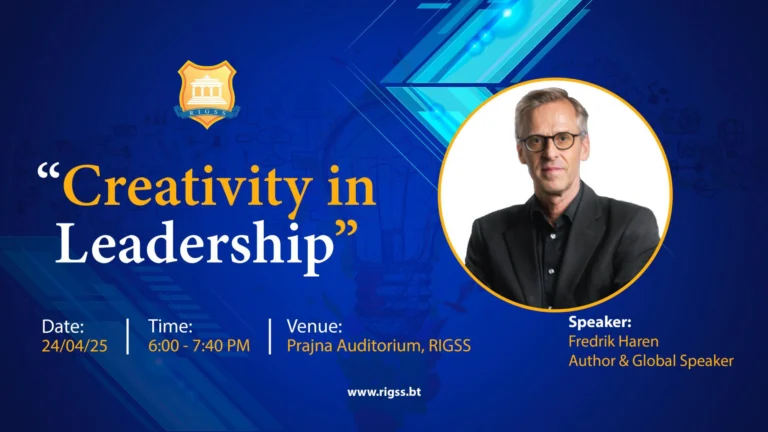
As part of the institute’s 12th Anniversary Special, His Excellency the Prime Minister, Dasho Tshering Tobgay, delivered a lecture on “Brand Bhutan” at the RIGSS Friday Forum.
The Friday Forum is an important part of the Institute’s broader mandate to foster dialogue, critical thinking, and shared understanding on issues that matter to Bhutan and the world.
The Prime Minister delved into Bhutan’s identity, its perception on the global stage, and the collective responsibilities of citizens in shaping ‘Brand Bhutan’ for the long-term future. Throughout the lecture, his central theme reaffirmed how Gross National Happiness (GNH) has been our guiding philosophy for development and national identity.
He opened the lecture by inviting the attendees to share how foreigners perceive Bhutan or its place on the global stage, describing the activity as a mini-branding exercise. Some foreigners in the crowd associated Bhutan with ‘purpose’, ‘prosperity’, ‘harmony’ and ‘growth with intention’ including terms such as ‘happiest people’ and ‘GNH’. Responses from the Bhutanese attendees included words like, ‘happiness’, ‘GNH’, ‘good leaders’, ‘our monarchs’, ‘clean environment’, etc. He acknowledged that while Bhutan is widely known as the happiest country, this image, though positive, represents only one aspect of the nation’s story.
“Branding is important in a commercial world; everybody knows branding is important. We buy products based on brand value, and we understand that product because of the brand. So, branding is a serious business. For example, Apple’s brand is valued at US $1.3 trillion. It conveys simplicity yet it is aspirational,” said the Prime Minister. Among others, he also highlighted how brands such as Nike and Coca-Cola established strong identities over the years, and how countries like Singapore, Japan and Estonia have been able to craft powerful nation-branding narratives such as global hub of innovation, seamless integration of tradition and innovation, and admirable digitalisation of services among others.
The Prime Minister emphasised that true to the image of Bhutan as a Gross National Happiness (GNH) country, our deeper identity is shaped not only by the four pillars of GNH – good governance, sustainable socio-economic development, preservation and promotion of culture and environmental conservation – but also by how these values and responsibilities are upheld by each and every Bhutanese citizen, as much as by the external perception of ‘Brand Bhutan’. He noted how these pillars are interlinked: a nation that believes in harmony and promotes its culture, respects its environment, and strives towards maintaining strong governance, inherently strengthening its national brand.
Drawing comparisons to globally renowned brands such as Apple and Coca-Cola, His Excellency underscored the importance of consistency and authenticity in national branding. He shared how Coca-Cola attempted to rebrand itself by altering its original formula to market a sweeter ‘New Coke’ in 1985 and how that failed. It was an example of how even widely established brands can be at risk when they move away from their core identity. Therefore, he urged every Bhutanese to safeguard the values and principles that define our national brand, “for it has been lived and reinforced by our ancestors, institutions and governance structures over the years”. He stressed that for Brand Bhutan to thrive, we must continue to remain true to Bhutan’s development philosophy and values that are rooted in GNH for all times to come. “Bhutan’s social harmony, environmental leadership, and strong governance are living embodiments of our brand. I am not a happiness guru. I am not a happiness expert, but I would suggest all of us work harder to stay happy. To me, personally, happiness comes from being physically fit, spiritually fit, mentally fit, socially fit, and professionally fit.” To be physically fit, the Prime Minister said, one must exercise regularly, maintain a healthy diet, and avoid harmful habits. These regimes, he added, are important to promote personal happiness, as illness or chronic disease can affect our well-being. He also expressed concern that many Bhutanese today suffer from non-communicable diseases, emphasising on the importance of preventive health and lifestyle choices. Therefore, he asked the audience to reflect on what it takes to be happy and to invest in what makes them truly happy.
He highlighted that over the years, Bhutan has achieved 71 percent literacy rate and 99 percent youth literacy, up from 12 percent 40 years ago and life expectancy rose from 46 to more than 70 years. “That is social progress and this progress has been achieved because healthcare is free, education is free. This is all a part of Bhutan’s character. No one can take it away. The system was set in stone by our monarchs. So, between health and education alone, 30% of the government’s budget is allocated to these two very important sectors. Because of good health and good education, Bhutanese can enjoy opportunities in our country and throughout the world.” This, he said, explains how Bhutan’s development approach is rooted in holistic well-being.
The Prime Minister focussed on our unique culture as one of our identities. He also mentioned that Bhutan is the world’s last remaining Vajrayana Buddhist Kingdom. “Foreigners refer to Bhutan as the last Shangrila.”
He also reiterated environmental sustainability as a strategic pillar of our national brand – with over 70 percent of our areas under forest coverage and our status as carbon-negative that sequesters five times more carbon than we emit, and stressed that these achievements must be protected through continued commitment to clean energy, organic farming and sustainable urban development as part of our nation’s identity. “If we want to be stewards of environmental conservation, we need to burn less fossil fuel and drive more sustainably, and walk more.”
The Prime Minister also mentioned Brand Bhutan’s success to our tourism policy of high value, low volume; our hydropower sector that generates clean energy; and our democracy, which was gifted to the people by our monarchs. “On the 2024 global peace Index, Nepal ranks 80, India 116 and Bhutan 21. Therefore, we must protect peace by protecting the rule of law, democracy and all the principles associated with them.”
He also cautioned that corruption, misinformation, and complacency could undermine our democratic principles and ultimately stain the image of ‘Brand Bhutan’. Therefore, he urged responsible citizenship by reporting corrupt practices to the Anti-Corruption Commission or any relevant authorities instead of circulating reports through social media. He emphasised that we should protect our corruption perception index by reporting and not by spreading misinformation. “If there is no corruption, we should not make it up. But if there is, we should not hesitate to report it,” he said, emphasising integrity as central to democracy and governance. He stated that freedom of speech and media must be exercised responsibly to protect the national brand. At the same time, he encouraged the strengthening of media capabilities in the country to uphold transparency and accountability.
His Excellency highlighted the unique social contract between the Bhutanese people and their monarchs. “We have ‘kidu’ support like no other. We have land kidu for landless, monetary support for destitute and other support for education and medical treatment. We have had the fewest deaths due to Covid-19 with the support and care from the Throne.” He also pointed out some of the visionary initiatives instituted by His Majesty The King – Gyalsung to ensure security, Pelsung to ensure economic prosperity and the Gelephu Mindfulness City (GMC) – where all the hopes of every Bhutanese are endowed. We must continue to be inspired by our King, and serve the King and the country”.
The Prime Minister also spoke on the need to adapt our identity to the evolving global contexts, emphasising that “while preserving tradition and cultural heritage, we must remain agile in responding to new challenges, to ensure that our brand remains relevant, respected and resilient globally.” He called on every citizen to uphold and strengthen ‘Brand Bhutan’ for “national branding should not be left to the government alone; it is in fact a shared responsibility and every citizen and institution has a stake in it.”
12th Anniversary of RIGSS
RIGSS remains committed to promoting dialogue and reflection on leadership, governance and public policy. We would like to thank His Excellency for the insights at the lecture that serve as a reminder that ‘Brand Bhutan’ is both a source of pride and a responsibility of every citizen to ensure how we present ourselves to the world as well as how we nurture these values at home in the most authentic way.
To honour and celebrate RIGSS’s 12th Anniversary, Interim Head of the Institute, Dasho Tashi Wangyal also took the opportunity to open the lecture and share with the attendees that RIGSS has been entrusted with several new mandates going forward:
- To develop the Flagship Mindfulness Leadership Program for Bhutan and the world, preparing leaders for a future defined by enlightened prosperity.
- To work closely with the Gelephu Mindfulness City Authority (GMCA) in identifying and addressing the City’s evolving leadership development needs.
- To forge global partnerships that will position RIGSS as a world-class institute in the coming years.
- To collaborate with the GMCA and the Royal Government of Bhutan as a crucible for the ideation and realization of the Diamond Strategy – a transformative national vision articulated by His Majesty The King on 17thDecember 2024.
“As we cross this important milestone, it is also a time for reflection and an opportune moment to reposition ourselves for the future,” announced Dasho Tashi Wangyal.
From the Attendees
“I thoroughly enjoyed the lecture by the Prime Minister. Before attending the lecture, I was a bit sceptical because I thought what more could be said about ‘Brand Bhutan’? It felt like an outdated topic and I was not sure if I’d make it through an hour and a half of the lecture. But to my surprise, the way he structured and packaged the whole content was both refreshing and gripping.” – A civil servant, Ministry of Health.
“I have never heard of Brand Bhutan. It was completely new to me. And I learnt a lot through the Prime Minister’s lecture tonight. Hereon, I will keep in mind that it is also our responsibility as citizens to uphold our national identity and brand, and not the government’s alone.” – Student, The Royal Academy, Paro.
“I already knew a bit about what Brand Bhutan means. But attending the Prime Minister’s lecture provided a deeper clarity on the topic. I can now better relate how the principles and values of GNH directly align with our national brand.” – Student, Motithang Higher Secondary School.
Public Relations and Partnerships Division
RIGSS




